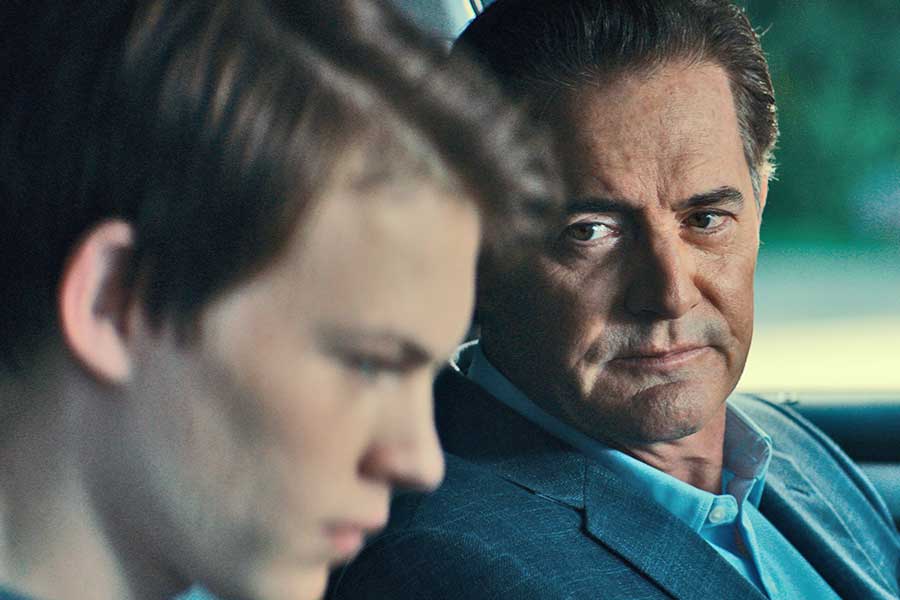Out gay Canadian writer/director Keith Behrman’s sophomore feature, “Giant Little Ones,” is an ambitious, over-stuffed drama about queer teen sexuality.
The film introduces Franky (Josh Wiggins) and Ballas (Darren Mann), two handsome 16-year-olds who have been best friends forever.
They, like most teenagers, have sex on the brain. Ballas claims to have done it six times with his girlfriend Jess (Kiana Madeira), while Franky’s still looking to lose his virginity to Priscilla (Hailey Kittle). Even Franky’s chemistry-lab partner, Mouse (Niamh Wilson), talks about needing to get laid.
When Franky celebrates his 17thbirthday with a party at his house, the night ends with sex — he and Ballas are in bed together. Behrman deliberately keeps what happens between the guys ambiguous, but the next morning Ballas talks about being wasted, dismissing Franky’s efforts at addressing what went down. Or rather, who went down. According to the rumors being spread around the crucible that is high school on Monday, Franky performed oral sex on Ballas.
When Franky’s mom, Carly (Maria Bello) learns about the incident, she chalks it up to experimenting. Franky’s dad, Ray (Kyle MacLachlan), who is gay and living with his partner, sees this encounter as an opportunity to get closer to his son who has been avoiding him since he left the family. Mouse counsels Franky to own his sexuality, but Franky, albeit confused by the events, insists he is not gay.
“Giant Little Ones” eventually reveals what happened between the boys and the consequences. It’s almost a let down in the grand scheme of things, but their friendship splinters into passive-aggressive and then aggressive-aggressive behaviors. It does not help the situation that Franky starts spending time with Ballas’s sister, Natasha (Taylor Hickson), who has her own sexual baggage, and couples up with him.
Behrman mines all this drama, drama, drama to explore teen sexual expression and repression, but he does it with the subtlety of a sledgehammer. Instead of sensitively exploring what happened between the teens and why they react the way they do, Behrman focuses on other case studies that provide context.
Ballas, who is captain of the swim team, is first seen advocating against homophobia in the locker room when one of his teammates is bullied. Mouse, who “likes to pack,” is expressing her gender-queer identity by wearing a cock sock, and, in one of the most uncomfortable scenes, she asks Franky to touch her strap-on and then let her see and touch his penis. It also does not go unnoticed that Franky’s father has a heart-to-heart with him about queer sexuality while they are literally standing in his closet. These scenes may be well-meaning stories about acceptance, but they feel very preachy.
“Giant Little Ones” nobly wants to explore gay, straight and fluid teen sexuality but merely raising the points fails to get at the truth behind them. The queer teen on the swim team is given the option to change alone in the locker room — but this is a not a solution to the larger problem of harassment. Mouse’s interest in the male anatomy seems to be something she only talks about to Franky, who does not judge her, but questions about her gender identity go undiscussed. Even when Franky insensitively remarks that his father’s couch is “gay”—prompting a lecture on terminology — it seems to be a missed opportunity for a greater conversation.
One of the few salient moments in the film has Natasha, who is damaged from sexual trauma in her past, ask Franky to be respectful of her wishes to “touch when it feels right.” At least these characters communicate their thoughts and feelings like adults.
In contrast, Ballas doesn’t does not discuss his emotions, and as tensions escalate between the two former friends, a scene of brutal violence occurs that is shamefully facile. Any hope that Behrman is trying to move the conversation forward is frustrated by his reliance on trite portrayals of closeted, questioning, or homophobic youth.
One of the hallmarks of teen stories is that the character becomes emotionally overburdened. “Giant Little Ones” is a coming-of-age story in this vein, but it feels contrived, not authentic. Watching Franky become more resilient should be empowering, but when he does man up, it seems too late. There is too little suspense in the narrative, which unfolds slowly; all that transpires feels curiously underwhelming.
As Franky, Josh Wiggins is appealing, but his character fails to generate much sympathy because of his odd behavior. As Ballas, Darren Mann is given little to do other than scowl after the sexual encounter with Franky. The film might have been interesting if it had alternated between their perspectives before arriving at the truth. In support, Norristown native Mario Bello, who co-produced the film, has a largely thankless mom role, while Kyle McLachlan does what he can with Ray’s big gay speech.
“Giant Little Ones” certainly tackles important issues, but it does it in a clumsy manner that dilutes the impact of its messaging.

